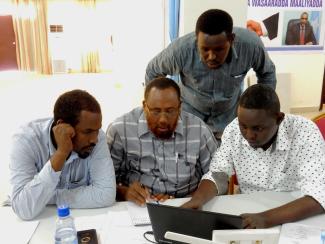September 2017—Following decades of conflict and insecurity, Somalia knows too well the costs of corruption on economic, political and social development. From 2010 to 2016, Somalia was perceived to be one of the world’s most corrupt countries, according to Transparency International's Corruption Perceptions Index.
Corruption can be limited through transparent and standardized procurement systems. In 2015, the Government of Somalia introduced the Somali Financial Management Information System, a computer-based system that tracks revenues and expense data across government institutions. By reducing data entry errors and enhancing error detection, such automated programs can reduce opportunities for corruption and enable better oversight and management. However, for such systems to function properly, government staff need to be fully trained.
To support the government’s efforts in moving toward a more transparent procurement system, the USAID-funded Strengthening Somali Governance activity supported a series of financial management courses focused on the new information system for civil servants working in the Ministry of Finance and other line ministries. Each participant practiced use of the various functions, including how to keep management level staff informed of vouchers in progress and how to avoid payment processing delays.
Forty-six civil servants from 34 government ministries and budgetary institutions participated in the trainings.
“Everything that we were taught we have put into practice … and this has really changed the way that I work at my office. Having completed numerous transactions, I can say that this process is much more efficient and transparent,” explained Farah Abdi Mohamed, a procurement officer at the Ministry of Interior and Federal Affairs.
Since September 2014, USAID’s three-year Strengthening Somali Governance activity has supported the development of effective and accountable governance across Somalia. The project supports efforts to enhance government outreach; increase citizen participation; improve the functioning of key government institutions; and expand women’s empowerment and leadership. In addition to training civil servants, civil society organizations and journalists, the project has provided voter education to 10,000 citizens in anticipation of the Somaliland election in November 2017.
LINKS
Follow @USAIDSomalia, on Facebook, on YouTube
,“Everything that we were taught we have put into practice … I can say that this process is much more efficient and transparent.”

Adan Salad
